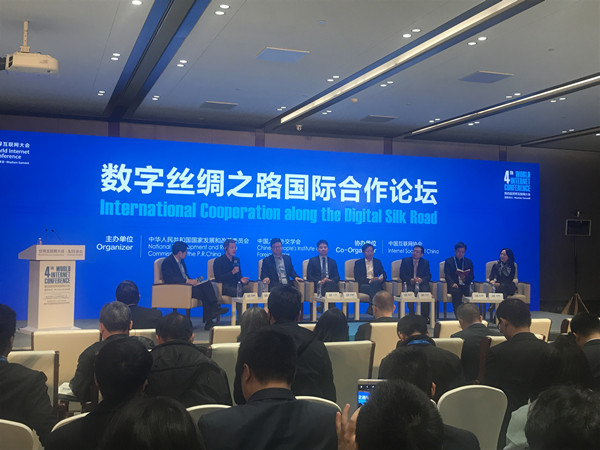China in fast lane on Digital Silk Road

The International Cooperation Along the "Digital Silk Road" Forum is held in Wuzhen, Zhejiang province on Dec 4, the second day of the 4th World Internet Conference. [Photo by Xiang Wenjian/chinadaily.com.cn]
The ancient Silk Road was a trade route that for centuries connected East and West. In this technological era, it is being revived via synergized government development strategies, interconnected smart cities, and cross-border e-commerce.
The International Cooperation Along the "Digital Silk Road" Forum was held on Day 2 of the 4th World Internet Conference in Wuzhen, Zhejiang province, with Chinese government officials, overseas dignitaries and tech heavyweights discussing the challenges and solutions for the digital future.
Hosted by Lin Nianxia, minister of the National Development and Reform Commission of China, the first discussion centred on how countries can work together to collaborate in terms of digital development and policy strategy.
"Digital is the new driving force of the Chinese economy and growth," Lin said. "It is a great opportunity for countries to work together with a new ecological development mentality."
Former French prime minister, Dominique de Villepin, said the digital economy has created "growth, empowerment, and development", and that 2017 is the first time in history in which more than half of the people in the world have access to the internet, compared with less than 20 percent just 10 years ago.
Such worldwide access has allowed China to exploit its advantages in digital economy on the global market.
"There has been a technological shift from the West to the East with the rise of internet champions in China as an alternative to the US monopoly," de Villepin said. "Then we have the opportunity to expand the internet far beyond the borders with the aim of sharing growth and development through international partnerships."
The former French prime minister suggested a Paris-style climate agreement to build a framework by which countries can work together on internet governance, security and development issues.
"The growing commitment of China in digital economy is a chance for both the region and the world - it is a chance for regional development as the Chinese authorities have proven their willingness to position China as a cyber power expanding internet services from Asia to Europe and Africa along the Digital Silk Road," de Villepin said.
Cooperation on the Digital Silk Road has benefited the economy in Malaysia, according to Wee Ka Sioog, deputy president of the Malaysian Chinese Association, who cited the country's establishment of the world's first Digital Free Trade Zone outside of China, in cooperation with Alibaba.

 Print
Print Mail
Mail
 20 Cultural Symbols
20 Cultural Symbols Why Zhejiang
Why Zhejiang Experiencing high-tech products at WIC
Experiencing high-tech products at WIC Zhejiang Release
Zhejiang Release Zhejiang News
Zhejiang News